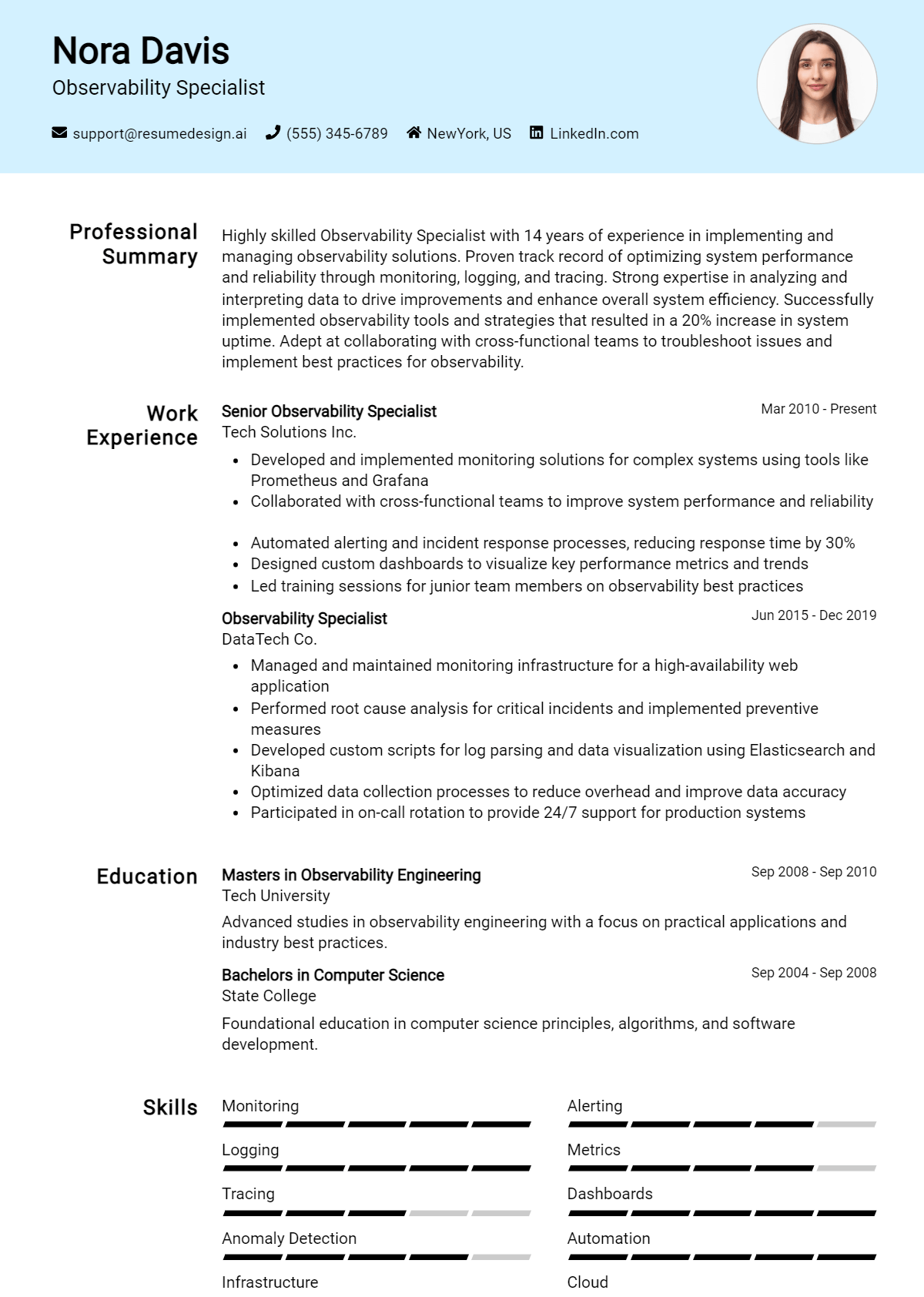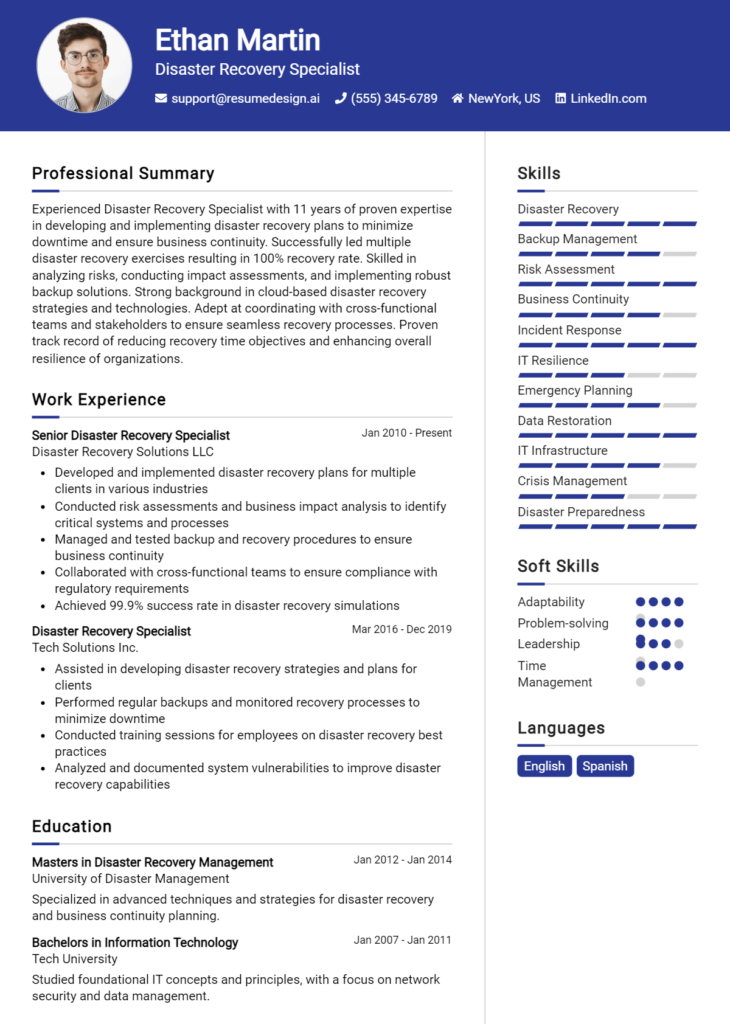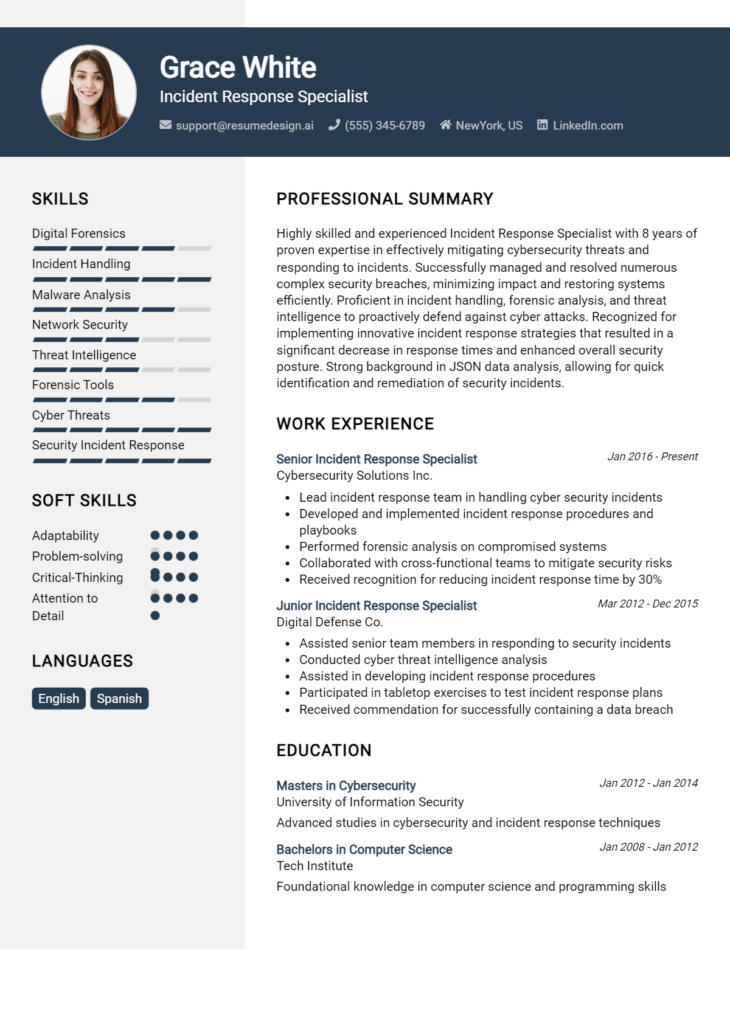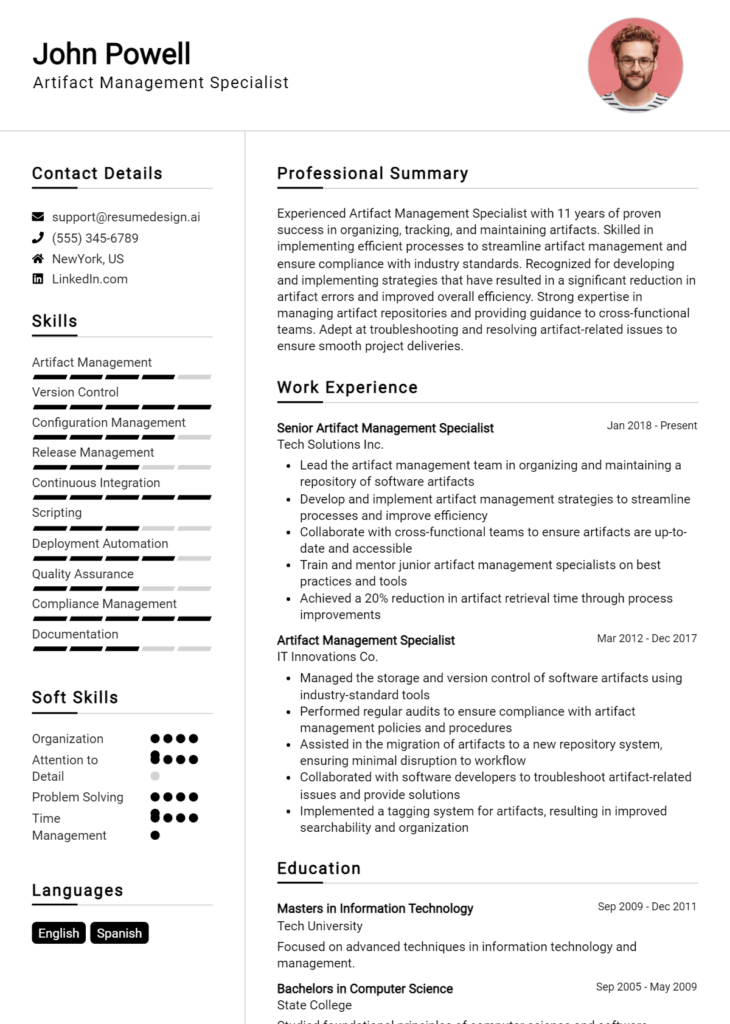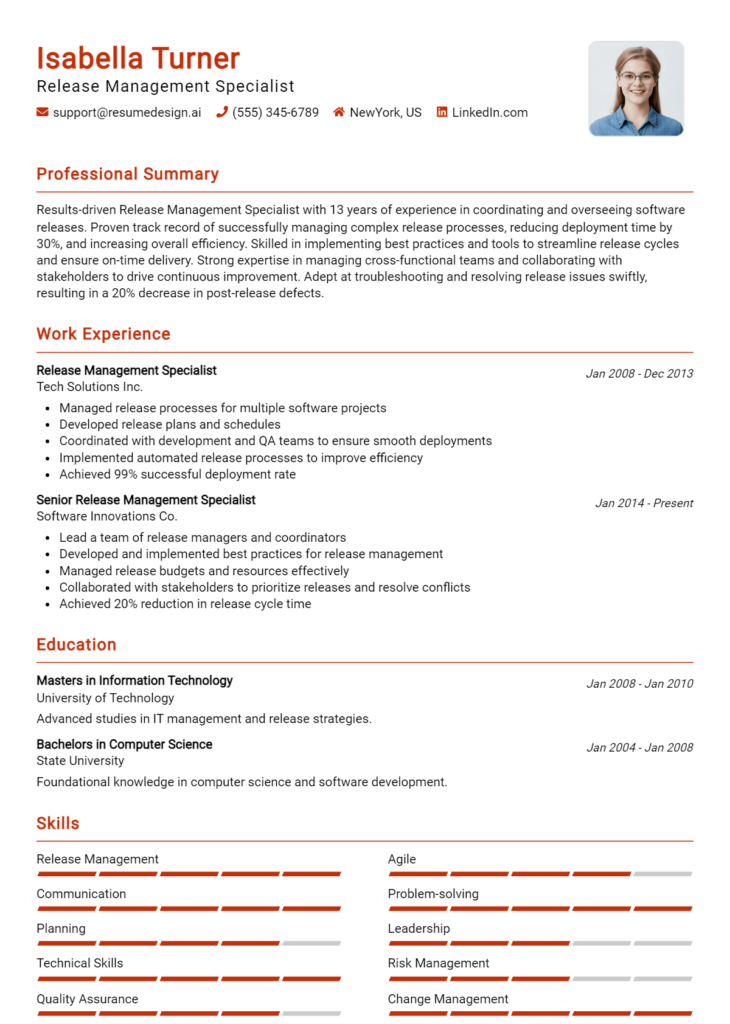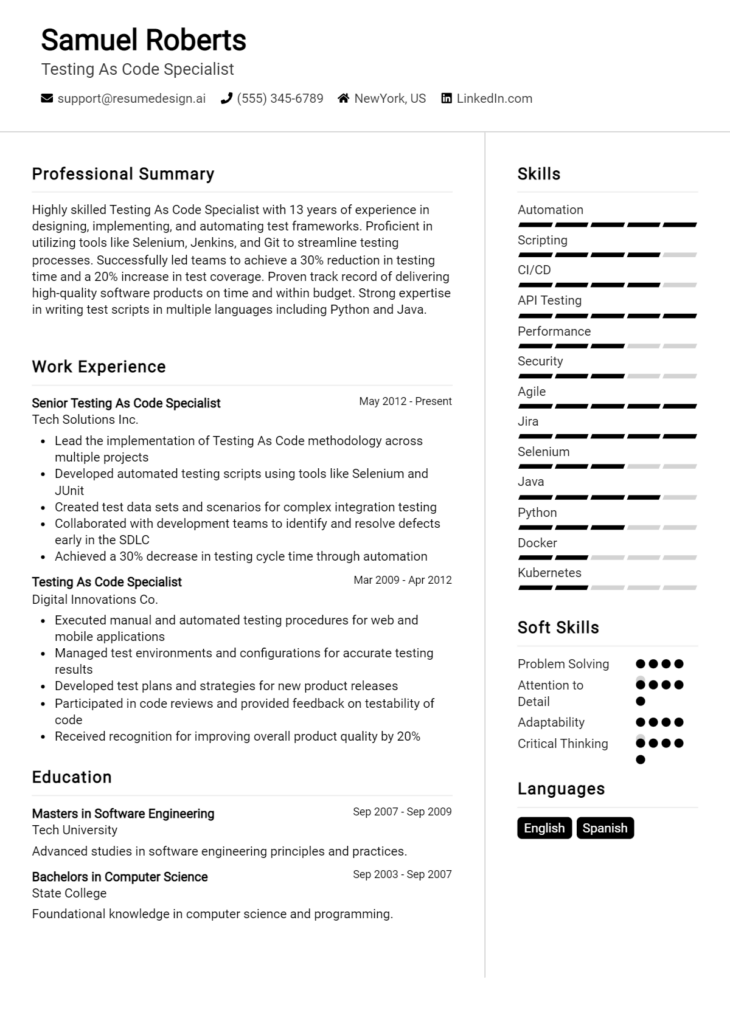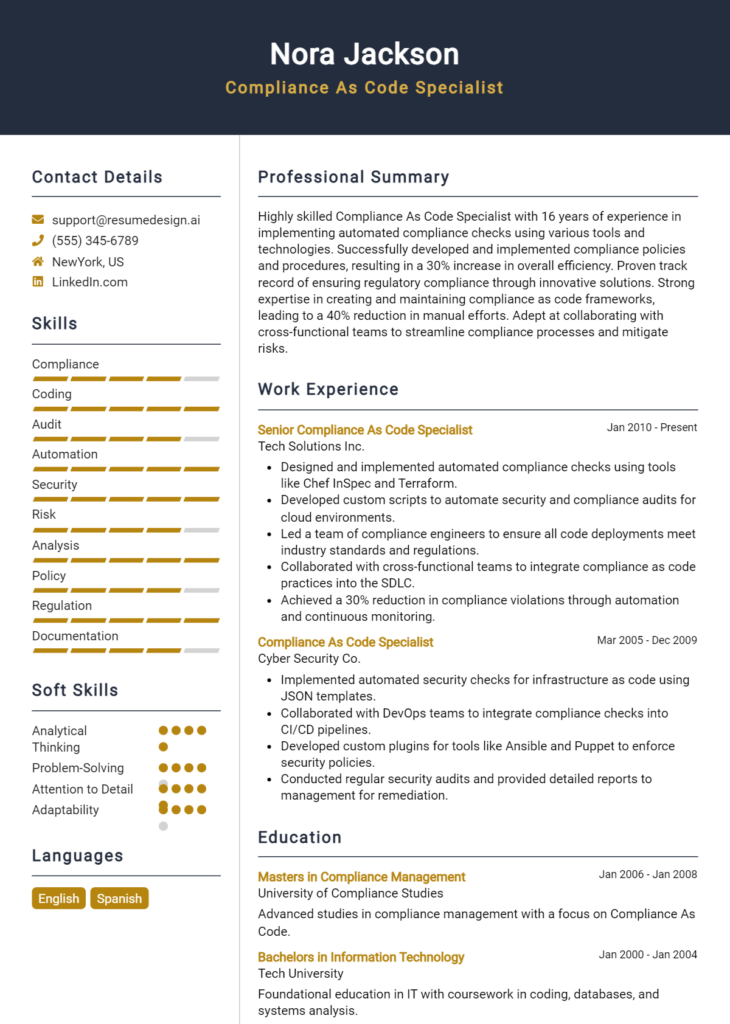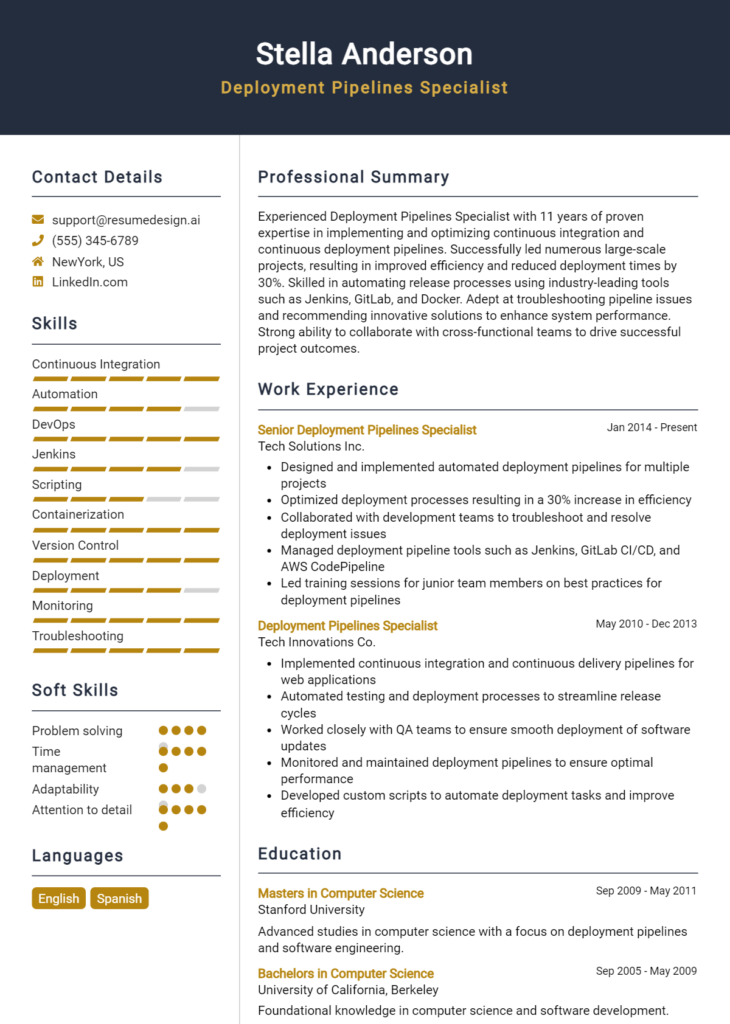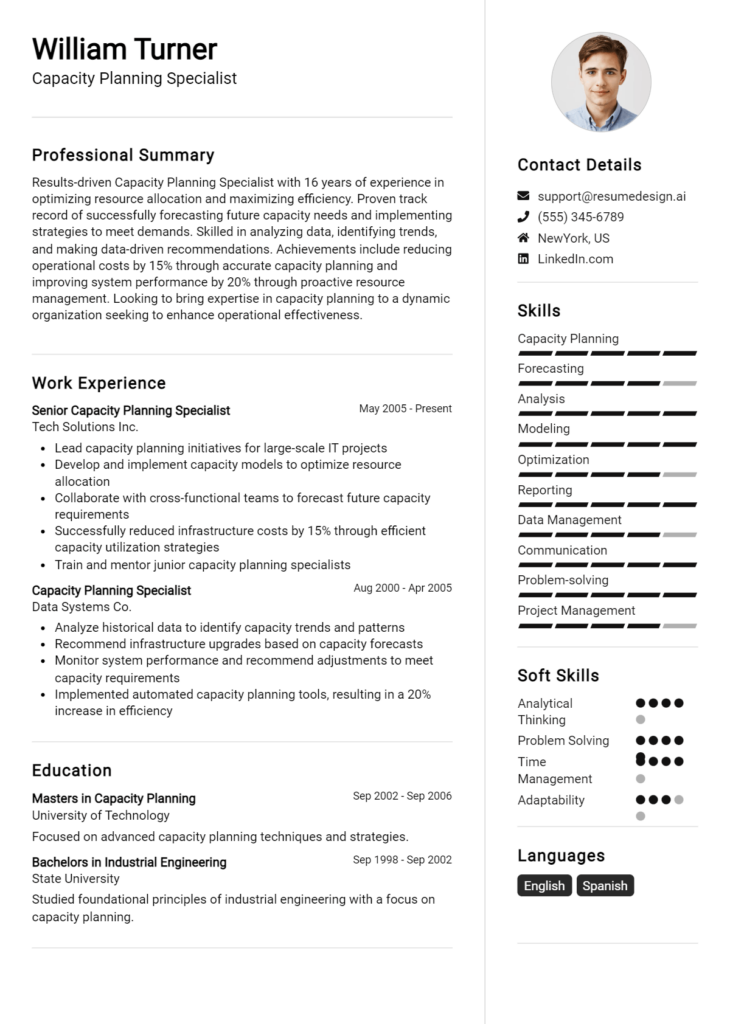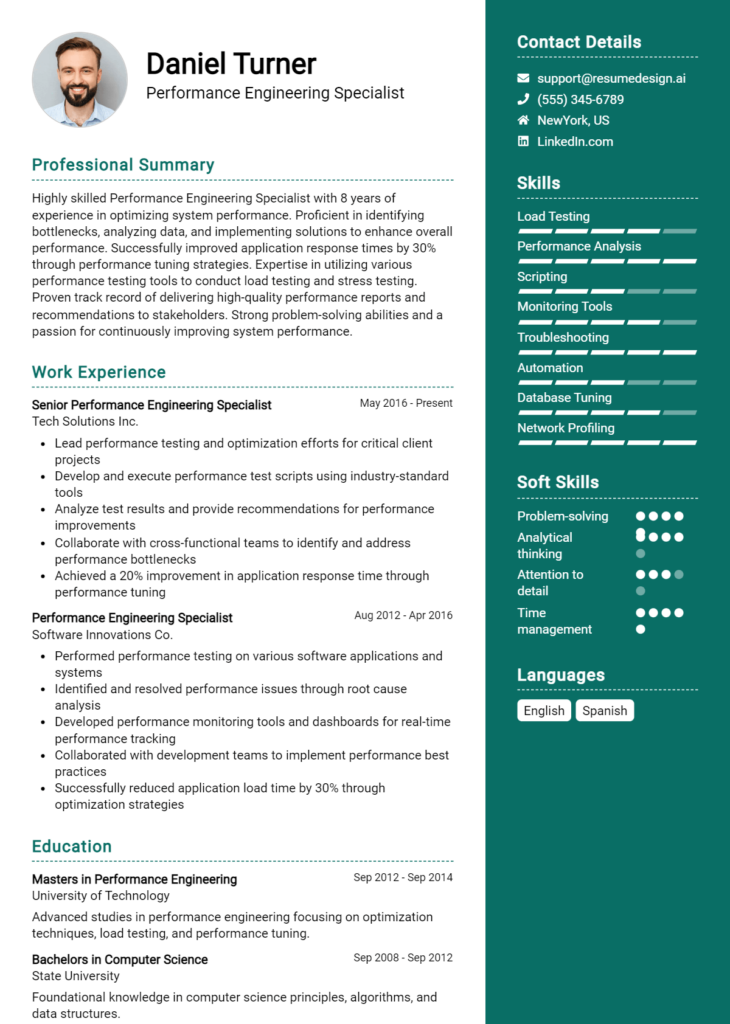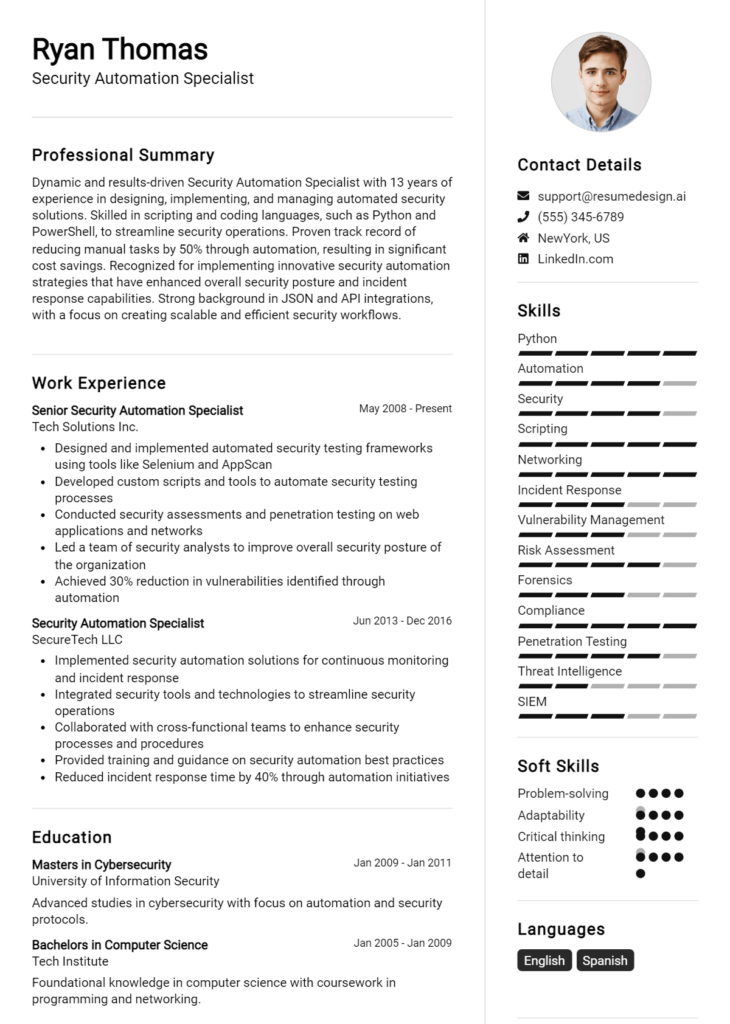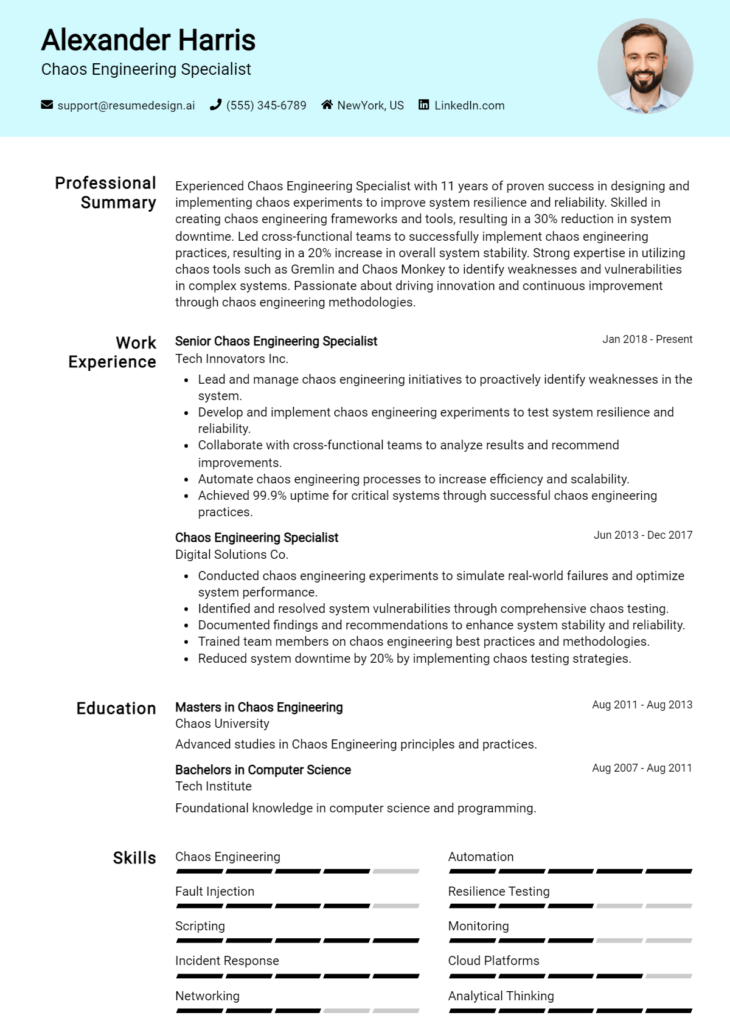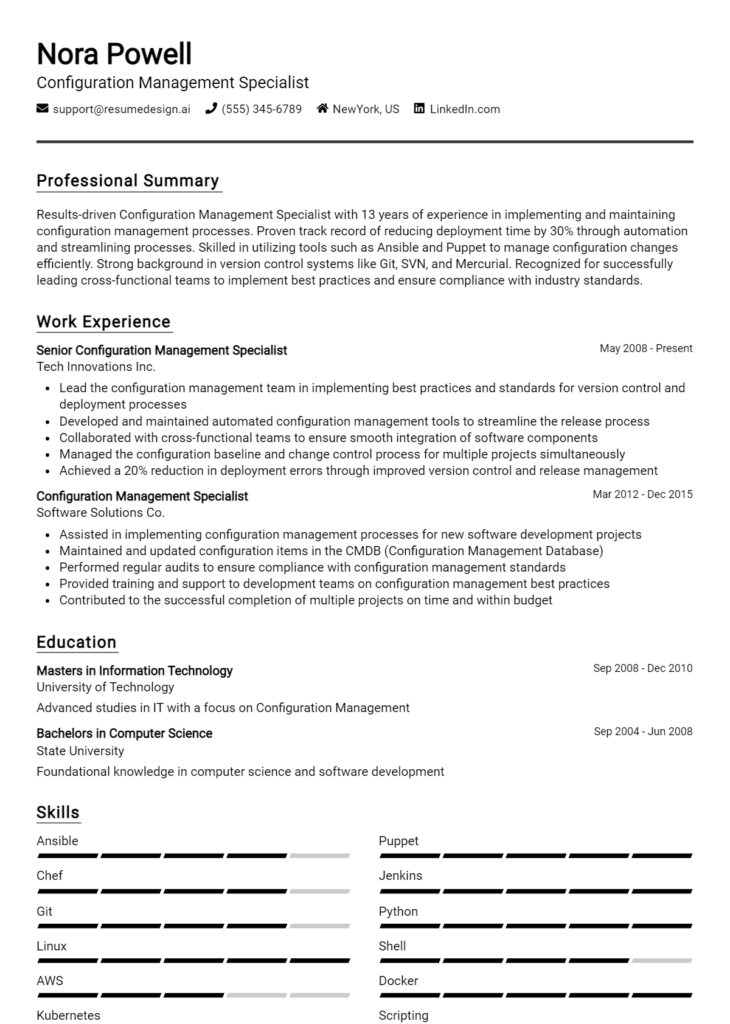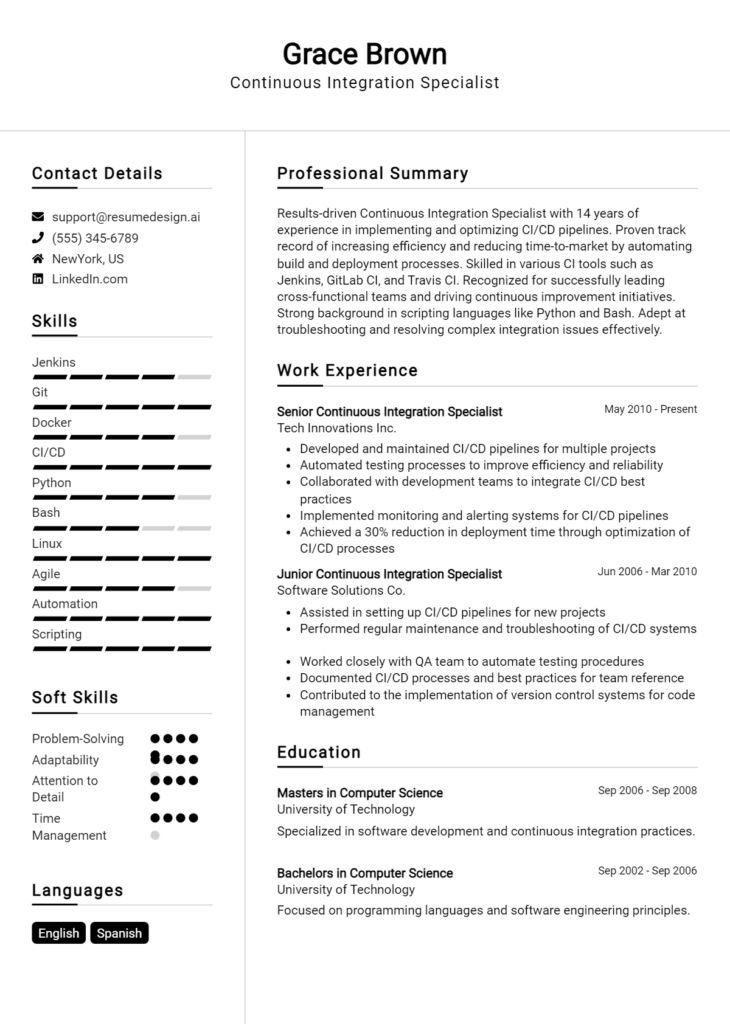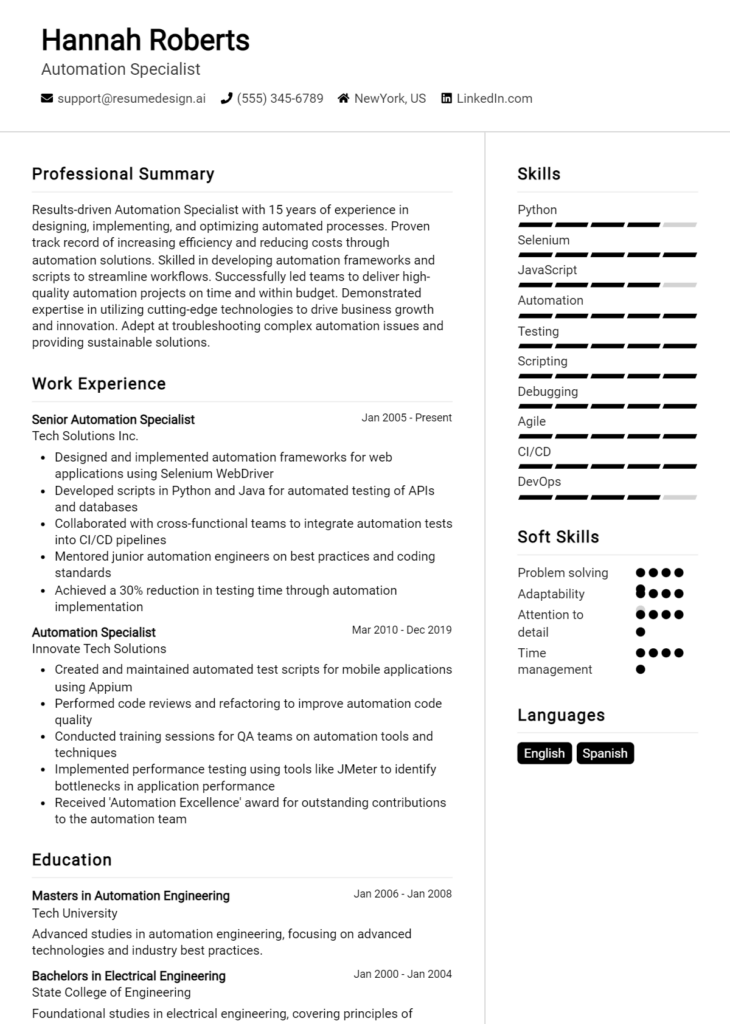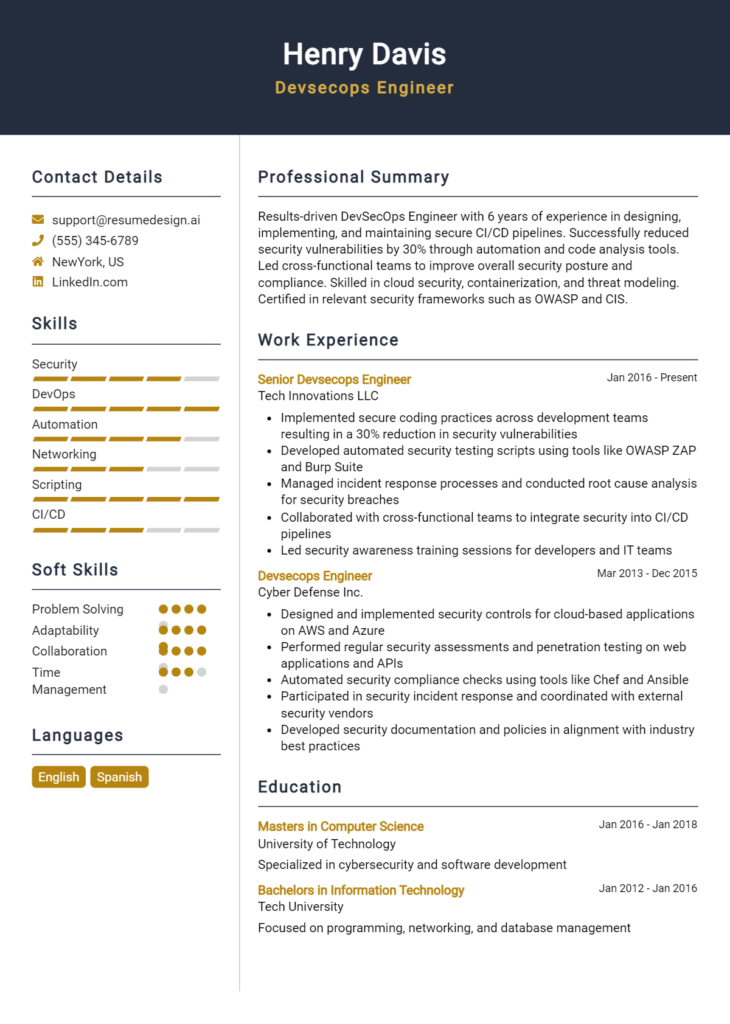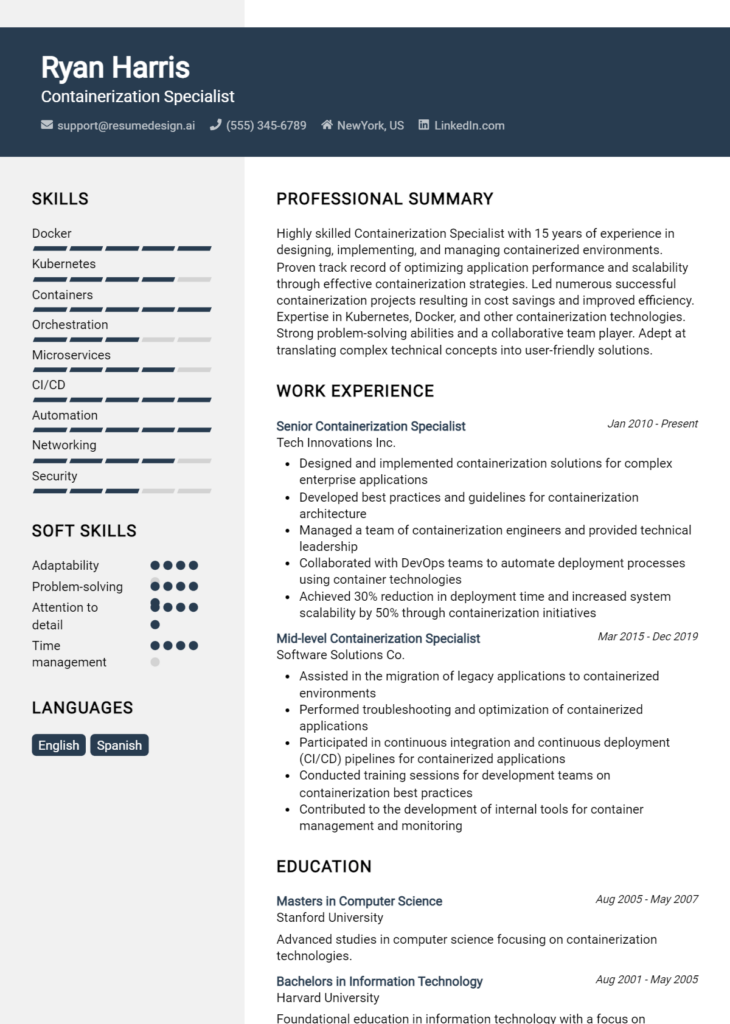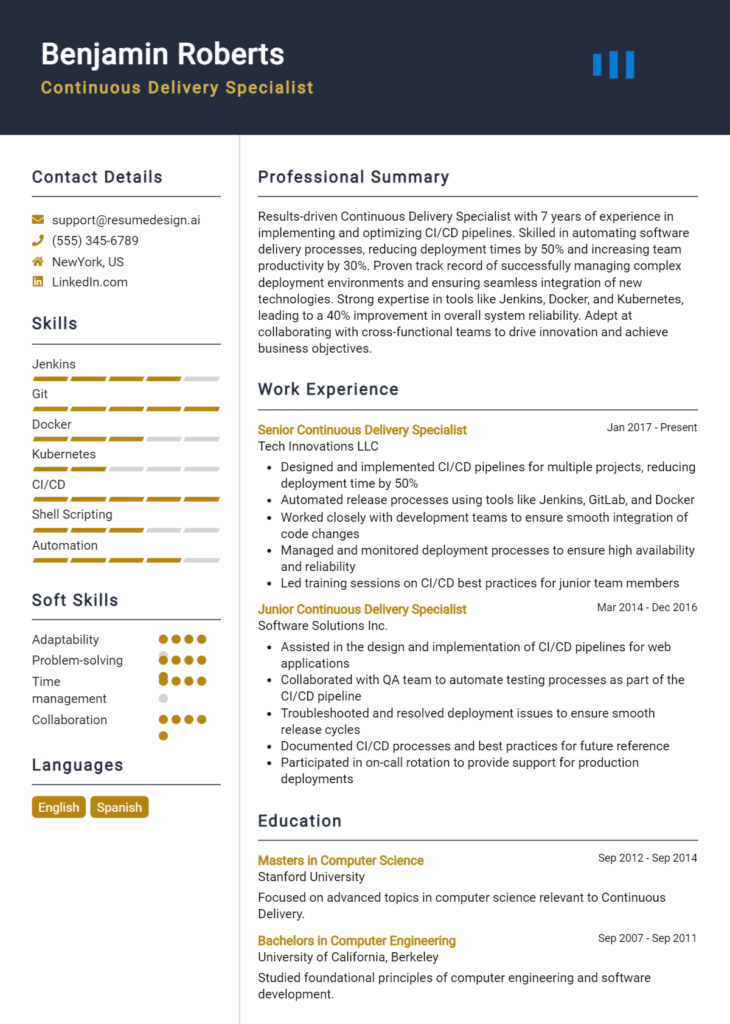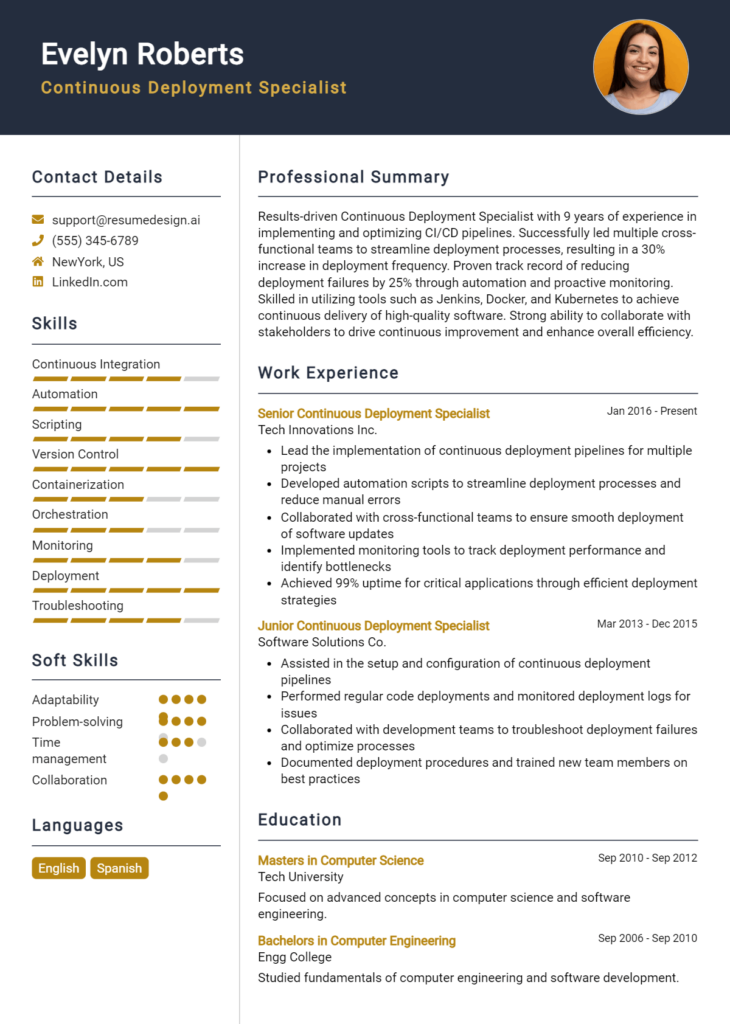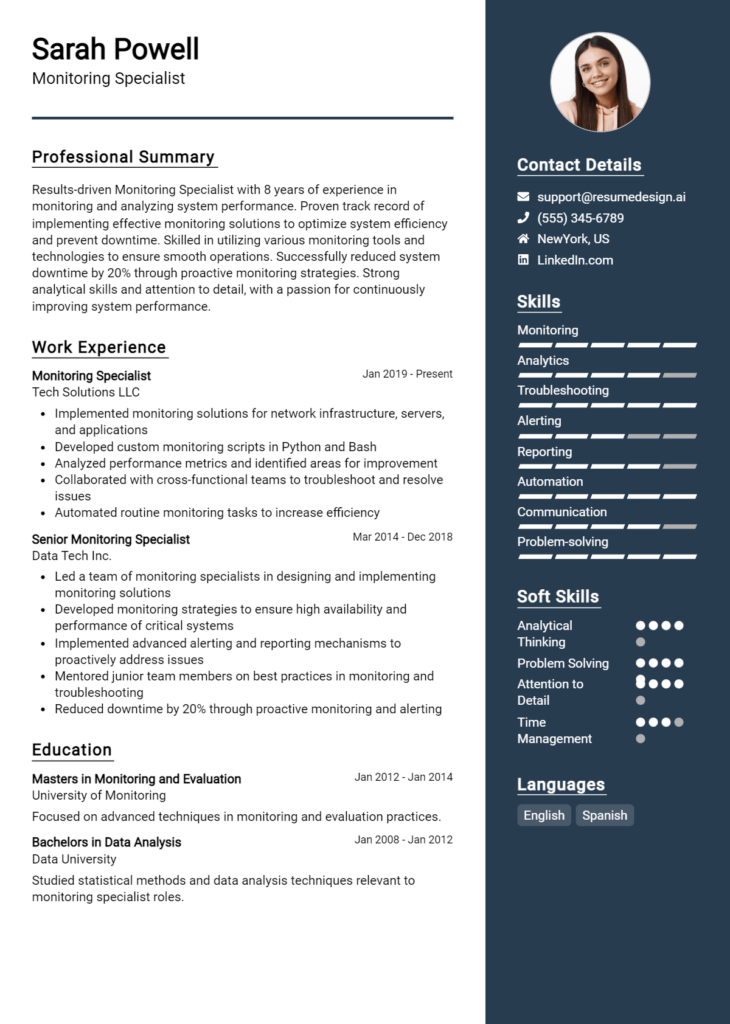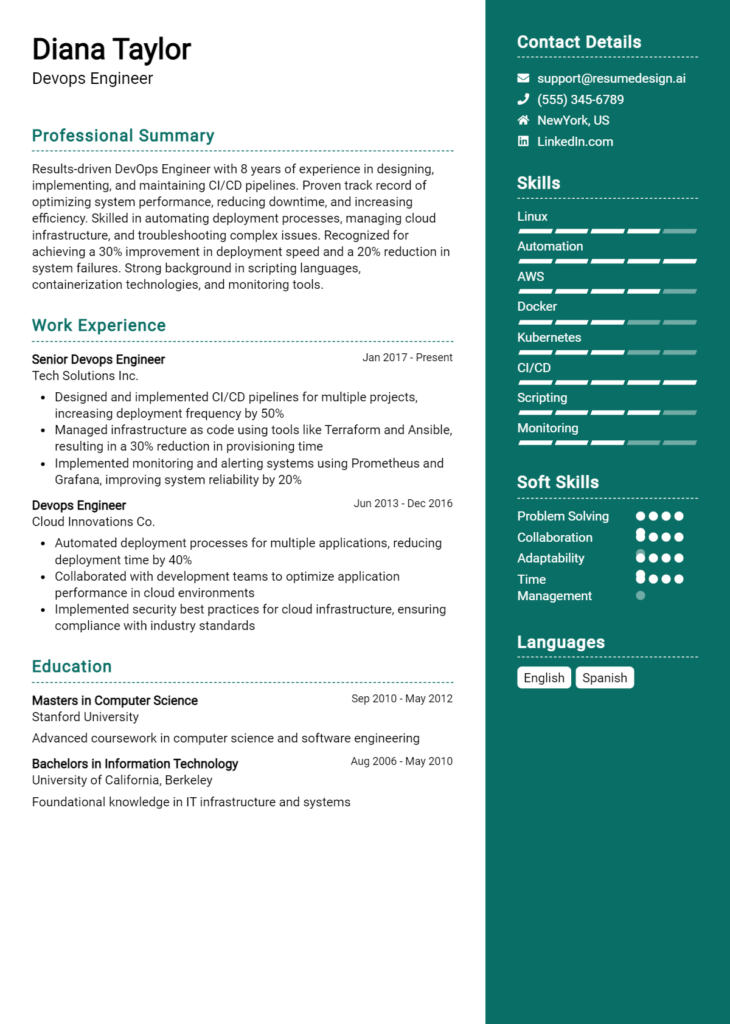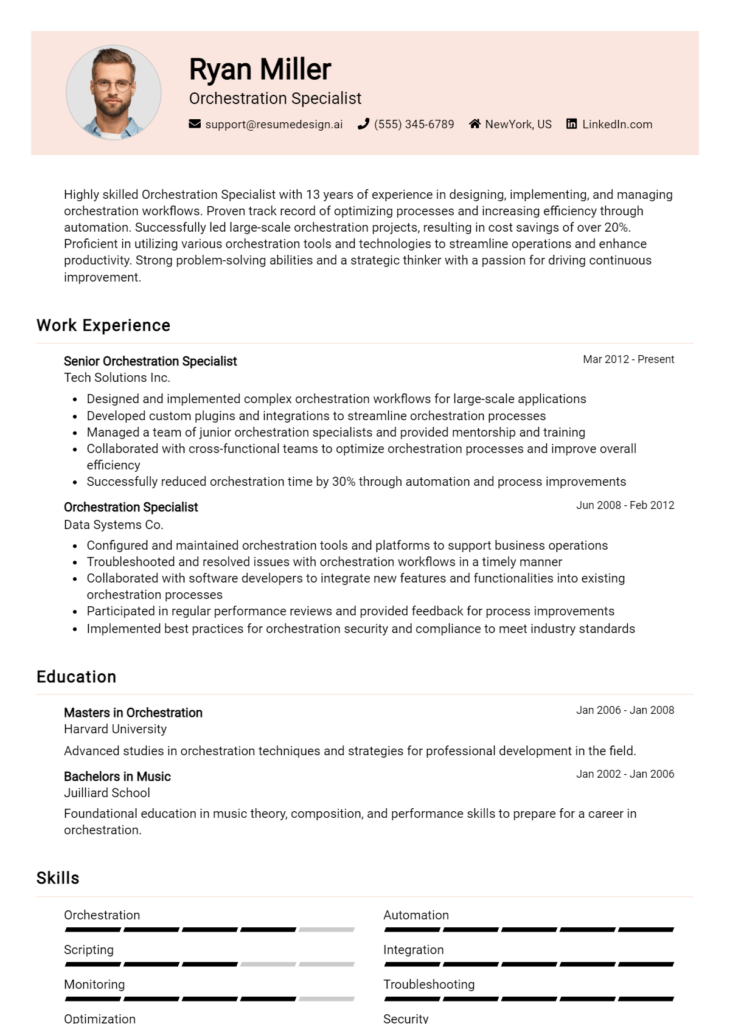Observability Specialist Core Responsibilities
An Observability Specialist plays a critical role in bridging technical and operational functions within an organization. Key responsibilities include designing and implementing monitoring solutions, analyzing system performance, and collaborating with cross-functional teams to resolve issues quickly. The ideal candidate must possess strong technical skills in data analysis and visualization, along with exceptional problem-solving abilities. These competencies are vital for driving organizational goals, and a well-structured resume can effectively highlight these qualifications, showcasing the candidate's potential impact.
Common Responsibilities Listed on Observability Specialist Resume
- Design and implement observability frameworks and monitoring solutions.
- Analyze system performance metrics and identify areas for improvement.
- Collaborate with DevOps, engineering, and support teams to troubleshoot issues.
- Develop and maintain dashboards for real-time system monitoring.
- Automate and streamline observability processes and workflows.
- Conduct root cause analysis for incidents and outages.
- Provide training and support for monitoring tools and best practices.
- Stay updated on industry trends and emerging technologies in observability.
- Document observability processes, tools, and reports for stakeholder visibility.
- Implement alerting strategies to proactively detect system anomalies.
- Ensure compliance with security and data privacy regulations.
High-Level Resume Tips for Observability Specialist Professionals
In today's competitive job market, a well-crafted resume is crucial for Observability Specialist professionals looking to make a strong first impression on potential employers. Your resume serves as a snapshot of your skills, experiences, and achievements, and it often determines whether you will be called for an interview. Given the technical nature of observability roles, it is essential that your resume clearly reflects your expertise in monitoring, logging, and performance optimization. This guide will provide practical and actionable resume tips specifically tailored for Observability Specialist professionals, helping you stand out in a crowded field.
Top Resume Tips for Observability Specialist Professionals
- Tailor your resume for each job application by aligning your skills and experiences with the specific requirements outlined in the job description.
- Highlight relevant experience by focusing on positions that involved observability tools, monitoring systems, or performance analysis.
- Quantify your achievements by including metrics that demonstrate the impact of your work, such as improved system uptime or reduced latency.
- Showcase industry-specific skills like proficiency in observability tools (e.g., Prometheus, Grafana, ELK stack) and cloud service providers (e.g., AWS, Azure).
- Utilize keywords from the job description to ensure your resume passes through Applicant Tracking Systems (ATS) effectively.
- Include certifications relevant to observability and monitoring, such as those from cloud providers or specialized observability platforms.
- Demonstrate your problem-solving abilities by describing challenges you’ve faced and the successful strategies you implemented to overcome them.
- Keep your resume concise and focused, ideally limited to one or two pages, while ensuring it is easy to read and visually appealing.
- Incorporate a professional summary at the top of your resume that encapsulates your expertise and career goals in observability.
By implementing these tips, you can significantly increase your chances of landing a job in the Observability Specialist field. A well-structured and tailored resume not only showcases your qualifications but also communicates your commitment to the role, making you a more attractive candidate in the eyes of potential employers.
Why Resume Headlines & Titles are Important for Observability Specialist
In the competitive field of observability, a well-crafted resume headline or title serves as the first impression a hiring manager has of a candidate. It is crucial for an Observability Specialist to encapsulate their key qualifications and expertise in a succinct phrase that stands out amidst a sea of applications. A strong headline not only grabs attention but also provides a snapshot of the candidate's core competencies, making it easier for employers to identify the right fit for their teams. Therefore, the headline should be concise, relevant to the position, and directly aligned with the job being applied for, effectively setting the tone for the rest of the resume.
Best Practices for Crafting Resume Headlines for Observability Specialist
- Keep it concise: Aim for a headline that is no longer than 10-12 words.
- Be role-specific: Tailor the headline to reflect the specific job title you are applying for.
- Highlight key skills: Incorporate your most relevant skills to showcase your strengths.
- Use impactful language: Choose powerful verbs and adjectives that convey confidence and expertise.
- Quantify achievements: If possible, include metrics or accomplishments to add credibility.
- Avoid jargon: Use clear and understandable terms that will resonate with a broad audience.
- Stay relevant: Ensure that the headline aligns closely with the job description and industry standards.
- Make it unique: Differentiate yourself by adding a personal touch that reflects your professional brand.
Example Resume Headlines for Observability Specialist
Strong Resume Headlines
"Experienced Observability Specialist with 5+ Years in Cloud Monitoring Solutions"
“Data-Driven Observability Expert Specializing in Distributed Systems Performance”
“Proficient in APM Tools and Metrics Analysis to Enhance System Reliability”
Weak Resume Headlines
“Seeking a Job in IT”
“Hardworking Professional”
The strong headlines are effective because they provide specific insights into the candidate's experience and areas of expertise, immediately aligning with the expectations of hiring managers in the observability domain. They employ clear language that conveys authority and relevance. Conversely, the weak headlines fail to impress as they are vague and generic, lacking any indication of the candidate's skills or qualifications relevant to the Observability Specialist role. Such headlines do not capture interest or provide a compelling reason for hiring managers to consider the applicant further.
Writing an Exceptional Observability Specialist Resume Summary
A well-crafted resume summary is essential for an Observability Specialist, as it serves as the first impression a hiring manager will have of a candidate. In a competitive job market, a strong summary captures attention quickly by emphasizing key skills, relevant experience, and notable accomplishments tailored to the specific role. This brief overview should be concise and impactful, making it clear why the candidate is an ideal fit for the position and setting the tone for the rest of the resume.
Best Practices for Writing a Observability Specialist Resume Summary
- Quantify Achievements: Use specific numbers or percentages to demonstrate your impact, such as improved system uptime or reduced incident response times.
- Focus on Relevant Skills: Highlight technical skills like monitoring tools, data analysis, and performance optimization that are directly related to observability.
- Tailor for the Job Description: Customize your summary to reflect the keywords and requirements listed in the job posting.
- Keep it Concise: Aim for 2-4 sentences that succinctly summarize your qualifications without unnecessary detail.
- Showcase Problem-Solving Abilities: Mention specific challenges you’ve addressed in previous roles and how you achieved success.
- Include Industry-Specific Terminology: Use language and acronyms that resonate with the observability field to demonstrate your expertise.
- Highlight Soft Skills: Incorporate soft skills like teamwork and communication that are crucial for collaborating with cross-functional teams.
- Use Active Voice: Write in an active voice to make your statements more engaging and assertive.
Example Observability Specialist Resume Summaries
Strong Resume Summaries
Results-driven Observability Specialist with over 5 years of experience in enhancing system performance through effective monitoring solutions, achieving a 30% reduction in incident response time and a 25% increase in application uptime.
Detail-oriented Observability Specialist skilled in using tools like Prometheus and Grafana to analyze system metrics, successfully implementing a new monitoring strategy that led to a 40% decrease in critical alert fatigue across teams.
Dedicated Observability Specialist with a proven track record in managing complex cloud infrastructures, reducing downtime by 20% through proactive monitoring and alerting, and fostering collaboration among engineering teams.
Weak Resume Summaries
Experienced professional looking for a position in observability. Good at monitoring systems and analyzing data.
Observability Specialist with some experience in the field. Interested in helping companies improve their performance.
The strong resume summaries are considered effective because they quantify achievements, specify relevant skills, and directly address the requirements of the role, making them compelling to hiring managers. In contrast, the weak summaries lack detail, fail to convey measurable success, and appear generic, which diminishes their impact and makes them less memorable.
Work Experience Section for Observability Specialist Resume
The work experience section of an Observability Specialist resume is crucial in demonstrating a candidate's technical skills, leadership capabilities, and track record of delivering high-quality products. This section not only highlights the applicant's hands-on experience with observability tools and practices but also showcases their ability to manage teams and projects effectively. By quantifying achievements and aligning their experiences with industry standards, candidates can significantly enhance their appeal to potential employers, ensuring they stand out in a competitive job market.
Best Practices for Observability Specialist Work Experience
- Use specific metrics to quantify achievements, such as performance improvements or cost savings.
- Highlight relevant technical skills and tools used in previous roles, such as monitoring software or logging frameworks.
- Showcase leadership and team management experiences, including mentoring junior staff or leading project initiatives.
- Detail collaborative projects with cross-functional teams to demonstrate communication and teamwork skills.
- Align experiences with industry standards and best practices in observability and monitoring.
- Include relevant certifications or ongoing training that enhances your qualifications.
- Use action-oriented language to convey impact and initiative in previous roles.
- Tailor the work experience section to match the job description of the position you are applying for.
Example Work Experiences for Observability Specialist
Strong Experiences
- Led a team of 5 engineers to implement a new observability framework, resulting in a 40% reduction in incident response time over six months.
- Designed and deployed a real-time monitoring system that improved application uptime from 95% to 99.9%, enhancing user satisfaction and retention.
- Collaborated with cross-functional teams to integrate observability tools into CI/CD pipelines, decreasing deployment failures by 30%.
- Mentored junior staff on best practices in observability, leading to a 25% improvement in team productivity and knowledge retention.
Weak Experiences
- Worked on observability tasks for a project.
- Assisted in monitoring systems without clear results or contributions.
- Participated in team meetings about observability.
- Helped with some technical documentation for observability tools.
The examples provided illustrate the difference between strong and weak work experiences. Strong experiences are characterized by specific achievements, quantifiable results, and clear indications of leadership and collaboration. They convey a sense of impact and relevance to the role of an Observability Specialist. In contrast, weak experiences lack detail, specificity, and measurable outcomes, making it difficult for potential employers to gauge the candidate's true capabilities and contributions.
Education and Certifications Section for Observability Specialist Resume
The education and certifications section of an Observability Specialist resume is crucial for showcasing a candidate's academic background and industry-relevant qualifications. This section not only highlights degrees and specialized training but also emphasizes the importance of continuous learning in a rapidly evolving field. Providing relevant coursework, certifications, and any specialized training can greatly enhance a candidate's credibility and demonstrate their alignment with the job role. In the tech industry, where tools and practices are constantly changing, showcasing a commitment to ongoing education can set a candidate apart from the competition.
Best Practices for Observability Specialist Education and Certifications
- Prioritize relevant degrees in computer science, data science, or related fields.
- Include industry-recognized certifications such as AWS Certified Cloud Practitioner or Google Professional Cloud Architect.
- Highlight any specialized training in observability tools like Prometheus, Grafana, or ELK Stack.
- Provide details of relevant coursework that aligns with observability, monitoring, and incident response.
- Keep the section concise but informative, focusing on the most impactful qualifications.
- Regularly update this section to reflect newly acquired credentials or advanced training.
- Consider listing online courses from reputable platforms that enhance your observability skills.
- Use clear formatting to make it easy for hiring managers to identify key qualifications quickly.
Example Education and Certifications for Observability Specialist
Strong Examples
- Bachelor of Science in Computer Science, University of Technology, 2021
- AWS Certified Solutions Architect – Associate, 2022
- Coursework in Distributed Systems and Cloud Computing, University of Technology
- Certified Kubernetes Administrator (CKA), 2023
Weak Examples
- Associate Degree in Arts, Community College, 2019
- Certification in Basic Computer Skills, 2020
- Degree in Philosophy, University of Knowledge, 2018
- Outdated certification in Windows Server 2008, 2015
The strong examples are considered relevant as they directly align with the knowledge and skills required for the Observability Specialist role, showcasing both technical proficiency and a commitment to the field. In contrast, the weak examples lack relevance to the position, featuring outdated certifications and degrees that do not contribute to the candidate's qualifications in observability and monitoring practices.
Top Skills & Keywords for Observability Specialist Resume
As an Observability Specialist, having the right skills is crucial for crafting a compelling resume that stands out in a competitive job market. The role requires a unique blend of technical knowledge and interpersonal abilities, enabling professionals to effectively monitor, troubleshoot, and optimize system performance. Highlighting both hard and soft skills in your resume can demonstrate your expertise and adaptability, making you an attractive candidate to potential employers. By showcasing your proficiency in relevant tools and methodologies alongside your communication and problem-solving abilities, you can create a well-rounded profile that speaks to your capabilities in this dynamic field. For further insights on enhancing your resume, check out these skills and work experience sections.
Top Hard & Soft Skills for Observability Specialist
Soft Skills
- Strong Communication Skills
- Problem-Solving Abilities
- Team Collaboration
- Critical Thinking
- Adaptability
- Attention to Detail
- Time Management
- Customer Focus
- Analytical Mindset
- Empathy
Hard Skills
- Proficiency in Monitoring Tools (e.g., Prometheus, Grafana)
- Experience with Logging Solutions (e.g., ELK Stack, Splunk)
- Knowledge of Distributed Systems
- Familiarity with Cloud Platforms (e.g., AWS, Azure, GCP)
- Expertise in Scripting Languages (e.g., Python, Bash)
- Understanding of Microservices Architecture
- Experience with CI/CD Pipelines
- Proficient in APM Tools (e.g., New Relic, Dynatrace)
- Knowledge of Networking Concepts
- Familiarity with Containerization (e.g., Docker, Kubernetes)
Stand Out with a Winning Observability Specialist Cover Letter
Dear [Hiring Manager's Name],
I am writing to express my interest in the Observability Specialist position at [Company Name], as advertised on [Job Board/Company Website]. With a robust background in observability frameworks and a passion for enhancing system performance, I am excited about the opportunity to contribute to your team. My experience in implementing observability solutions has equipped me with the necessary skills to monitor, analyze, and optimize complex systems, ensuring seamless operations and improved user experiences.
In my previous role at [Previous Company Name], I successfully led a project to implement a comprehensive observability strategy that reduced incident response times by 30%. By leveraging tools such as Prometheus, Grafana, and ELK Stack, I enabled our engineering teams to gain deeper insights into application performance and system health. My hands-on experience in creating custom dashboards and alerts has allowed teams to proactively address potential issues before they impact end users. I am particularly drawn to [Company Name]'s commitment to innovation and would be thrilled to bring my expertise in observability to enhance your systems further.
I am also a strong advocate for collaboration and knowledge sharing, having conducted numerous workshops to educate teams on observability best practices. My ability to communicate complex technical concepts to non-technical stakeholders has proven invaluable in fostering a culture of observability within organizations. I am eager to partner with cross-functional teams at [Company Name] to ensure that observability is not just a tool but a fundamental aspect of your development lifecycle.
Thank you for considering my application. I look forward to the opportunity to discuss how my skills and experiences align with the goals of [Company Name] and contribute to the success of your observability initiatives.
Sincerely,
[Your Name]
[Your LinkedIn Profile]
[Your Contact Information]
Common Mistakes to Avoid in a Observability Specialist Resume
When crafting a resume for the role of an Observability Specialist, it's essential to present your skills and experience effectively to stand out in a competitive job market. However, many candidates fall into common pitfalls that can undermine their chances of landing an interview. Avoiding these mistakes can significantly enhance the quality of your resume and showcase your expertise in observability practices. Here are some common mistakes to steer clear of:
Lack of Tailoring: Failing to customize your resume for the specific job can make it seem generic. Tailor your skills and experiences to align closely with the job description.
Neglecting Technical Skills: Omitting relevant technical skills, such as familiarity with monitoring tools (e.g., Prometheus, Grafana), can leave a gap in your qualifications. Be sure to highlight your proficiency in the tools that are essential for observability.
Vague Job Descriptions: Providing unclear or overly broad descriptions of your previous roles can confuse recruiters. Use specific examples and metrics to illustrate your impact in past positions.
Ignoring Soft Skills: While technical skills are crucial, overlooking soft skills such as communication and collaboration can be detrimental. Observability specialists often work with cross-functional teams, so highlighting these attributes is important.
Overuse of Jargon: While industry-specific terminology is important, using too much jargon can alienate readers who may not be familiar with all the terms. Strive for clarity to ensure your resume is accessible to a broader audience.
Omitting Achievements: Focusing solely on responsibilities rather than accomplishments can weaken your resume. Quantify your achievements with metrics that demonstrate your contributions to previous projects.
Poor Formatting: A cluttered or unprofessional format can distract from your content. Use clean, organized formatting with clear headings and bullet points to enhance readability.
Neglecting Continuous Learning: Failing to mention any ongoing education or certifications in observability can signal a lack of commitment to professional growth. Highlight any relevant courses or certifications to show your dedication to staying current in the field.
Conclusion
As we wrap up our exploration of the Observability Specialist role, it's essential to highlight the critical skills and experiences that make candidates stand out in this competitive field. From a solid understanding of monitoring tools and data analysis to the ability to troubleshoot complex systems, the role demands a unique blend of technical expertise and problem-solving capabilities.
Furthermore, familiarity with cloud-native architectures and an ability to work collaboratively with cross-functional teams are also pivotal in ensuring effective observability across services. Continuous learning and staying updated with the latest trends and tools in observability are key to maintaining relevance in this dynamic landscape.
Now is the perfect time to review your Observability Specialist resume to ensure it reflects your skills and experience accurately. Tailoring your resume can significantly enhance your chances of landing that dream job. To assist you in this process, consider utilizing resources like resume templates, which can provide a polished format; the resume builder, which offers an easy way to create a professional-looking resume; and resume examples to inspire you with ideas on how to present your qualifications. Don’t forget the importance of a well-crafted cover letter, and explore our cover letter templates to help you make a strong impression.
Take action today—revise your resume, leverage these tools, and position yourself as a top candidate in the observability domain!

